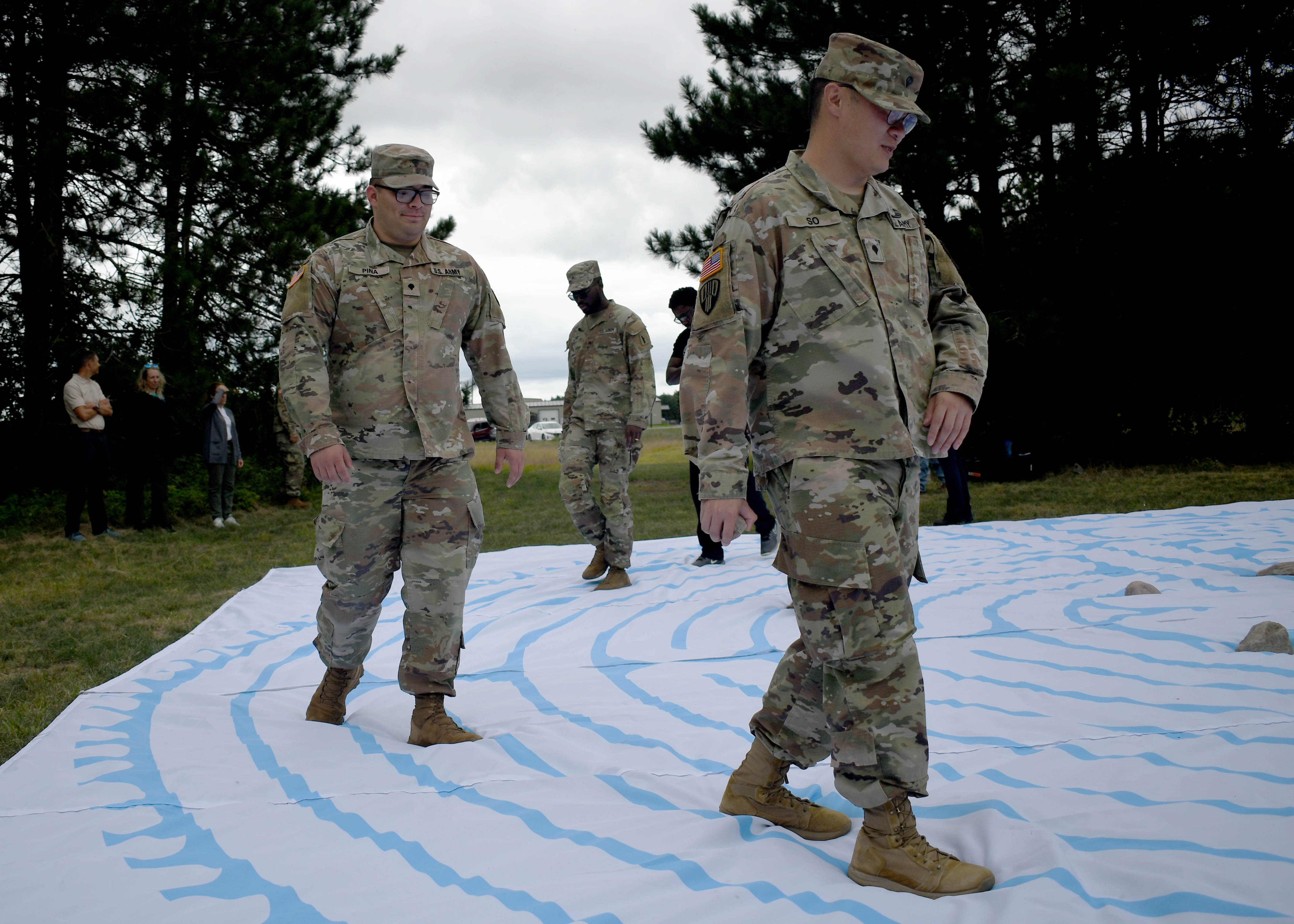FORT DRUM, New York –
For Soldiers in recovery, the path to healing following trauma can be a long and challenging road. While many focus on the visible physical injuries Soldiers endure, the emotional trauma hidden behind the surface can leave a lasting impact if not adequately addressed.
To help aid wounded, ill, and injured Soldiers, Fort Drum’s Soldier Recovery Unit hosted the Boulder Crest Foundation’s Struggle Well course July 22-26, 2024. Struggle Well is a comprehensive program that trains Soldiers to transform their struggles into strength and growth so that they can better serve themselves, their families, their community, and their country.
Representatives with Boulder Crest spent the five days with the SRU Soldiers “going over what Posttraumatic Growth is and how we can implement it into our lives,” said Dana De La Rosa, a master guide with the Struggle Well program. “This is a non-clinical program that is training peer-to-peer. We get to talk to the Soldiers like we’re trainers, like we’re back in the uniform. So, it’s a very different approach to the modern mental health model.”
Throughout the week, program facilitators from Boulder Crest led Soldiers in a wide range of interactive exercises designed to explore perspectives on struggle and learn practices to regulate thoughts, feelings, and actions.
One of the more notable exercises was the labyrinth. Based on the design of ancient warrior cultures, the labyrinth was a time for reflection. Each Soldier walked the maze to the center, carrying a rock equal to the weight they felt they’d been carrying. As they exited, Soldiers were asked to reflect on what they’d left behind and look forward to the new life they are moving into.
“We can get caught in the struggles of our lives, and we can get stuck there, and that’s hard, and it’s human,” De La Rosa said. "But it’s also hard to do the work, to do the practices we know are good for us. So, it comes down to choosing which hard you want to live with. Doing the work is hard, but then you get to live a great life.”
 FORT DRUM, N.Y. – U.S. Army Spc. Jarvis So, right, a network communication systems specialist with the 101st Signal Battalion, 53rd Troop Command, New York National Guard, and Brooklyn, N.Y. native, and Spc. Joaquin Pina, a water treatment specialist currently assigned to Fort Drum’s Soldier Recovery Unit and a native of San Jose, Calif., walk the labyrinth during the Boulder Crest Foundation’s five-day Struggle Well program at Fort Drum, N.Y., July 25, 2024. Based on the design of ancient warrior cultures, the labyrinth gives participants time for reflection as they walk to the center, carrying a rock equal to the weight they feel like they’ve been carrying. (U.S. Army photo by Warren W. Wright Jr., Fort Drum MEDDAC Public Affairs)
FORT DRUM, N.Y. – U.S. Army Spc. Jarvis So, right, a network communication systems specialist with the 101st Signal Battalion, 53rd Troop Command, New York National Guard, and Brooklyn, N.Y. native, and Spc. Joaquin Pina, a water treatment specialist currently assigned to Fort Drum’s Soldier Recovery Unit and a native of San Jose, Calif., walk the labyrinth during the Boulder Crest Foundation’s five-day Struggle Well program at Fort Drum, N.Y., July 25, 2024. Based on the design of ancient warrior cultures, the labyrinth gives participants time for reflection as they walk to the center, carrying a rock equal to the weight they feel like they’ve been carrying. (U.S. Army photo by Warren W. Wright Jr., Fort Drum MEDDAC Public Affairs)
According to one participant, the most valuable aspect of the week-long program was working with other Soldiers dealing with similar issues and being comfortable sharing experiences in a supportive environment.
“This was a safe space for us to get (our stories) off our chest because when you keep everything inside, it’s a tension that gets old, and eventually you start to reach your limit, and you don’t know what could happen,” said Spc. Jarvis So, a network communication systems specialist with the 101st Signal Battalion, 53rd Troop Command, New York National Guard, and Brooklyn, New York native. “When we were sharing our stories, it was a good place for us to fix it, and it also brought us closer together. It’s definitely better to have someone guiding us through this process who experienced the same things.”
According to their website, the bedrock of Boulder Crest’s program is Posttraumatic Growth, a way to transform the way society thinks, feels, and acts when it comes to notions of mental health and struggle. By tailoring their innovative programs based on the science of PTG, participants experience growth and thrive in the aftermath of traumatic events.
“The biggest thing that I hope they take away is that they deserve to live a great life,” De La Rosa said. “These skills are trainable, realistic, and attainable for them. Once they realize that we’re not here to blow smoke, then there’s a turn of events where they’re like, ‘I can do this; this is possible for me, even though I might be going through something hard right now.’”
The Fort Drum Soldier Recovery Unit provides primary care case management for Soldiers in transition to establish conditions for their healing and promote their timely return to the force or transition to civilian life.